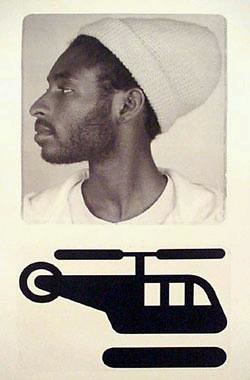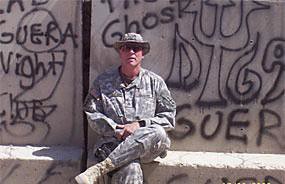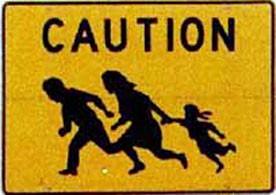Islam is at the heart of an emerging global anti-hegemonic culture that combines diasporic and local cultural elements, and blends Arab, Islamic, black and Hispanic factors to generate "a revolutionary black, Asian and Hispanic globalization, with its own dynamic counter-modernity constructed in order to fight global imperialism. (say what!)
Wednesday, May 31, 2006
the wrath of farrakhan
Tuesday, May 30, 2006
jesus isn't magic
Monday, May 29, 2006
the native orientalists aka "it's easy out here for a sell-out"
best of friends, worlds apart
When I first skimmed this article I thought it was a gimicky human-interest story, but after rereading it, I saw that it was more nuanced than that. It gets into both the positive and negative aspects of race relations in Cuba and looks at the factors which can "guide" Cuban immigrants (whether black or white) to find a place in the US' system of racial identity.
The article made me think of an uncle who once told me that white Cubans were the most racist people on Earth. I would have expected a piece like this to oversimplify and paint a picture of two best friends living in a racial utopia coming to the US and suddenly growing apart. But the article did a half-way decent job of showing that many of the attitudes held by white Cubans in Miami weren't just a result of Americanization but came with them in their luggage (especially when presenting the perspective of Bill Brent, the former Black Panther living in Cuba).
Friday, May 26, 2006
terms of use
(Actually, the guy posing in the above picture is a pretty cool and amazing artist in his own right named Umi Vaughan. He's from Oakland but last I heard he was chillin' in Cuba, presumably working on an anthropology doctorate. If I get my thoughts together I'll say more about him, an interesting guy. Se hizo santo!).
Thursday, May 25, 2006
daara j brings rap back to its african roots
Despite the urgent nature of the material, ''Boomerang" is brimming with optimism. Daara J -- which means ''school of life" -- weds buoyant Afro-Cuban rhythms, crisp hip-hop grooves, and soulful R&B vocals to lyrics that tumble out in a celebratory cultural stew of French, English, Spanish, and their native Wolof.
The album's title refers to the group's belief that hip-hop was, if not born, at least seeded in Africa. ''When we were taken from Africa to be slaves and sent to all parts of the world, a form of rap called tasso, which is rhythm-based storytelling, already existed," explains Freddy. ''When it left the motherland, it remained dormant for a while. And then one day it was awakened. African-Americans forgot where it originally came from. It was a natural evolutionary process for it to come back to Africa, where we have developed it further!"
an apology to james yee
While Yee was stationed in Guantanamo as a chaplain to the detainees, he was charged with spying, threatened with the death penalty, put in solitary confinement, and tortured until the Army decided to drop the charges. He subsequently resigned his commission. If you are unfamiliar with his story, I urge you to listen to him or read his account at Democracy Now! . He has just published a book about his experiences called For God and Country: Faith and Patriotism Under Fire.
Monday, May 22, 2006
juan cole on the da vinci code
Sunday, May 21, 2006
the religious left is back
gangs claim their turf in iraq
The Gangster Disciples, Latin Kings and Vice Lords were born decades ago in Chicago's most violent neighborhoods. Now, their gang graffiti is showing up 6,400 miles away in one of the world's most dangerous neighborhoods -- Iraq.
There are at least two sides to this: What are the implications of having gang-affiliated soldiers in Iraq? (But actualy, this doesn't seem to be a big concern because in Iraq, the American soldiers, even those in rival gangs, are united by a common enemy.) The larger issue is what happens in urban areas when gang members go back home with military know-how and access to equipment? Can we say blowback?
us secretly backing warlords in somalia
The latest clashes, last week and over the weekend, were some of the most violent in Mogadishu since the end of the American intervention in 1994, and left 150 dead and hundreds more wounded. Leaders of the interim government blamed U.S. support of the militias for provoking the clashes.
The country has a weak transitional government operating largely out of neighboring Kenya and the southern city of Baidoa. Most of Somalia is in anarchy, ruled by a patchwork of competing warlords; the capital is too unsafe for even Somalia's acting prime minister to visit.
Leaders of the transitional government said they have warned U.S. officials that working with the warlords is shortsighted and dangerous.
"We would prefer that the U.S. work with the transitional government and not with criminals," the prime minister, Ali Mohamed Gedi, said in an interview. "This is a dangerous game. Somalia is not a stable place and we want the U.S. in Somalia. But in a more constructive way. Clearly we have a common objective to stabilize Somalia, but the U.S. is using the wrong channels."
Many of the warlords have their own agendas, Somali officials said, and some reportedly fought against the United States in 1993 during street battles that culminated in an attack that downed two U.S. Black Hawk helicopters and left 18 Army Rangers dead.
"The U.S. government funded the warlords in the recent battle in Mogadishu, there is no doubt about that," government spokesman Abdirahman Dinari told journalists by telephone from Baidoa. "This cooperation . . . only fuels further civil war."
U.S. officials have refused repeated requests to provide details about the nature and extent of their support for the coalition of warlords, which calls itself the Alliance for the Restoration of Peace and Counter-Terrorism in what some Somalis say is a marketing ploy to get U.S. support.
Saturday, May 20, 2006
blog break
Tuesday, May 16, 2006
el emigrante
I could have made this another "why the devil has more vacation-time than santa" post but later changed my mind about the title. A few days ago I read an article about a racist video game called Border Patrol (available free online) where the objective was to shoot Mexicans trying to cross the border; you could kill a "drug smuggler" a "mexican nationalist" or a "breeder" (a pregnant woman with two children). In the course of looking for the game I also found Krazie Bone's Ghetto Chase where the player runs from the police through various backyards (collecting crack pipes and marijuana leaves for extra points), Kaboom! The Suicide Bombing Game (pretty self-explanatory) along with many other games in a similar vein. On some level, I've known for a while that video games have been pushing the envelope and getting more and more extreme, but I'm actually (a little) surprised by how many games out there are racist, stereotypical, crudely violent and offensive. It makes me feel old and crotchety.
For a more academic look at the border patrol game, read Buzzle.com's "Border Patrol" Video Game: Appalling Social Irresponsibility
And for a slightly different sort of game, check out El Emigrante where you get to be a Mexican mouse (Speedy Gonzalez?) on a bicycle fleeing from the police. It is different from Border Patrol in that the player identifies with the immigrant and it is different from Kaboom and Ghetto Chase in that it doesn't blatantly employ stereotypes. In contrast with the previous games, El Emigrante isn't racially offensive but it is deafeatist. (There is no way to win. The immigrant always gets caught, it's just a matter of time).
What do you think?
Monday, May 15, 2006
nommo
star spangled hypocrite
From the Black Commentator: Star spangled hypocrite features links to a Spanish version of the Star-spangled banner commissioned by the U.S. Bureau of Education in 1919, four different Spanish versions of the anthem available on the U.S. State Department's website, and news accounts of a certain someone apparently having no problem with Spanish versions of the national anthem when pandering to Latino voters on the campaign trail.
should africa look to latin america?
Sunday, May 14, 2006
jesus in india
Thursday, May 11, 2006
the third resurrection is still alive and kicking
Wednesday, May 10, 2006
as a black latina, where do i count?
When the U.S. Census recently reported that Latinos had replaced African-Americans as the largest minority in the United States, I wondered, "How can I replace myself?"
Monday, May 08, 2006
is there racism in latin america?
Sunday, May 07, 2006
from vicente guerrero to vicente fox
on being black at a latino march
I like the article overall. My one huge complaint would be the unstated assumption that being "Black" implies being non-immigrant and Anglo. I once met a woman from Ghana who used the labels "plane Blacks" and "boat Blacks" (based on how folks came to be in the United States). In general I don't like those sorts of divisions but I have noticed that a lot of times "boat Blacks" (in my head, I sometimes use the term Afro-Gringos) tend to assume that there are only a small number of ways to "be Black" (i.e. those based on the experience of slavery in the United States, especially the American South, Reconstruction, the Great Migration, the Civil Rights movement and modern hip-hop culture.) And there is often a tendancy to marginalize and ignore the Black experience in other parts of the Americas, Africa, and the rest of the diaspora.
Van Jones' piece below is well-intentioned and worth reading. But his difficulties with the Spanish slogans and "Latin" (probably African) rhythms have more to do with his Anglo-ness than his Blackness
On Being Black at a Latino March by Van Jones
Friday, May 05, 2006
late first impressions of may 1st
Firstly, I think these sorts of events are amazing. It is powerful and galvanizing to think of thousands of people coming out just to affirm that they have rights and demand that they be treated fairly. I was especially impressed with how diverse the speakers were. "Of course" Mexican and Mexican-American speakers were well represented but other voices definitely made contributions.Young. Old. Male. Female. Latino. Muslim. African-American. Legal. "Illegal". And white allies from the labor movement.
Secondly, what gave me a bit more to think about was how ideologically diverse the people involved seemed to be. Immigration, affirmative-action, anti-war, pro-local economy, labor. Everyone had their issue. It made me wonder if the group of people gathered there would be able to continue to coordinate their efforts and agree what a next step would look like. To be hoest, the strategic/critical side of my brain was a little skeptical of what political changes would really come out of that particular gathering. But the friend whom I was with pointed out that its not really about that. It has more to do with letting people know that they are not alone, letting them feel empowered, letting them have a voice. The rest comes later.
A day without an immigrant
Immigrant Solidarity Network
No HR 4437 Network
A.N.S.W.E.R. and the Great American Boycott
immigration across the blogosphere
Tuesday, May 02, 2006
senzala or quilombo
natural islam
islamic anarchism?
blacks and immigration reform
In a strange twist of events leading up to the “Day Without Mexicans” protest, there was suddenly this overwhelming focus on where African Americans stood on the issue. While this focus certainly was heightened by a half-cocked Ted Hayes rollin’ into Leimert Park with Minutemen in tow, talkin’ about Black people will help immigrants build an economy in Mexico. Hayes is clearly the latest iteration of Sambo politics that advances the position of the conservative right without any concern of how crazy he really makes black people look. Of course, the media is there front and center, while a few so-called “black spokespersons” front off the whole race escalating Black/Latino tensions on a whole ‘nother front simply because some folk want to scapegoat immigrants and play up the politics of fear that permeate two already exploited communities. These Negroes are trying to do to immigrants what America did to Blacks at the end of the 19th Century when poor whites decried that Blacks were taking their jobs because of industrialization. That’s what makes this dangerous.
The fact that African Americans feel the need to take position needs to be called into question. There has been no Latino “litmus test” on HR 40 (Reparation bill) or even where Latinos stand on police abuse or jailhouse attacks on African Americans. We tend to cooperate where we can, but each community has its own issues. Yet, “are you with us” is now a prevailing inquiry among Blacks and Latinos. Certainly any group that knows the social change history of Blacks in America (including the history of the “Day of Absence” for which this protest was modeled) know that our involvement in social (and political change) is crucial. Yeah, this legislation is targeting Mexicans, but Haitians, Jamaicans, and Africans impacted by this bill. We should be allies in advocating for compassionate reform. Solidarity where possible. That’s how it’s always been.
There are deeper issues here. The concern that immigrants take jobs from black people drives the opposition. It’s a false premise that has nothing to do with immigration, and everything to do with competition. Immigrants don’t take work—they make work. They sell fruits, or flowers or other goods. Most of the jobs they fill are not jobs Blacks want. I know over three dozen upper middle class black families looking for black gardeners but can’t find one. It’s the same with housekeepers, babysitters, live-in nannies and day laborers. The competition between Black and Latinos (on all levels) stem from the networks each creates that support their desire to work and improve their communities. Only 25% of all jobs in America are advertised. The rest are “inside referrals.” Work is disappearing for African Americans because we want to be the only one on the job and put little in the job “pipeline.” Latinos refer who they know. Blacks used to do the same.
Blacks could provide enough jobs for everybody to work if they’d only support themselves. In 1965, it was Jewish businesses taking work from Blacks. In 1992, it was Koreans. Now, it’s immigrants. And opposing Blacks think they can help immigrants build their “own country.” Yeah, right? That’s pure rhetoric and the source of the confliction on this issue—an issue not really ours. Blacks can’t build their own economy here in America. We need not play the role of being victims.
Wanna know our issue? Black America’s focus should not be on who’s taking jobs, but who’s making jobs. When Blacks learn how to make work, they’ll have work. Immigration won’t even be an issue. It’s not for any other community who simply make work for their people to work.
Anthony Asadullah Samad is a national columnist, managing director of the Urban Issues Forum (www.urbanissuesforum.com) and author of 50 Years After Brown: The State of Black Equality In America. He can be reached at www.AnthonySamad.com
"when you get yourself into a situation you can't get out of..."
From the movie Traffic:
You know, when they forced Khruschev out, he sat down and wrote two letters to his successor. He said - "When you get yourself into a situation you can't get out of, open the first letter, and you'll be safe. When you get yourself into another situation you can't get out of, open the second letter". Soon enough, he gets into a tight situation, and he opens the first letter. It says - "Blame it all on me". So he blames it all on the old guy, and it worked like a charm. When he got himself into a second situation, he opened the second letter. It said - "Sit down, and write two letters..."
The full screenplay for Traffic



